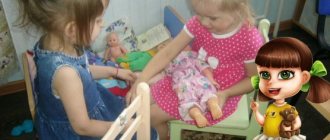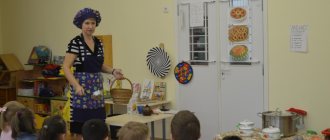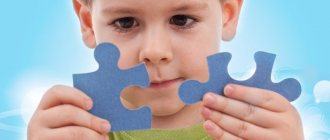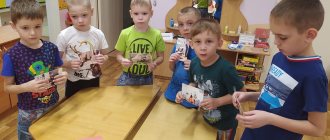The importance of role-playing games in the upbringing and development of a child
For a preschool child, play is a leading activity, a form of organizing life activity, and the main means of comprehensive development.
Starting from early preschool age, children show interest in play. However, they do not fully master gaming skills, and therefore children are very interested in playing with an adult. By middle preschool age, children already know how to play with each other; one of the most interesting games for them is role-playing game.
Definition 1
A role-playing game is a game that has a specific plot - a series of interconnected events and situations, and the roles that are distributed among its participants, and are the main core of the game.
Are you an expert in this subject area? We invite you to become the author of the Directory Working Conditions
Role-playing games are aimed at developing memory, thinking, imagination and personality in general in preschoolers.
The pedagogical value of a role-playing game lies in the fact that in addition to the relationships that are dictated to children by the plot of the game, other real and actual ones arise between them. During the game, children learn to interact with each other, understand how they relate to successes and failures, and learn to resolve conflict situations. The game helps the child overcome his timidity and embarrassment, and develops a variety of skills (work, play, communication, etc.), depending on the plot of the game.
Role-playing games teach children to independently establish relationships with the team and develop productive communication skills.
The game can be organized by a teacher who explains the plot to the children, assigns roles and manages the entire process of the game. The game can also be organized by children independently. When organizing the game independently, children themselves assign roles and follow the development of the plot. The game can be organized by children based on a fairy tale they read, a cartoon they watched, or the plot can be invented spontaneously (for example, a game of school, hospital, etc.).
Finished works on a similar topic
Course work Role-playing game, its role in the upbringing and development of a child 480 ₽ Abstract Role-playing game, its role in the child’s upbringing and development 250 ₽ Test work Role-playing game, its role in the child’s upbringing and development 240 ₽
Receive completed work or specialist advice on your educational project Find out the cost
In the process, role-playing games and joint play activities help children develop organization, responsibility, self-control and self-regulation skills, and consistency with the actions of other children. As the plot of the game develops, children acquire planning skills, creative imagination, initiative, activity, determination, etc.
Note 1
Thus, the role of role-playing games in the upbringing of a preschool child is very great, since it contributes to the comprehensive and complete development of the child’s personality and the formation of the necessary skills and abilities.
Article The role of role-playing games in the modern world. Author: Nadolko Svetlana Anatolyevna
The role of role-playing games in the modern world.
Today, many sources of knowledge have appeared in the life of a modern preschooler (books, television, communication with adults outside kindergarten). Modern life brings its own changes.
Recently, there has been a decrease in the level of role-playing games among preschoolers. Children play less, their role-playing games are more primitive and monotonous. This is apparently due to the fact that children are increasingly moving away from adults, they do not see or understand the activities of adults, and are poorly acquainted with their work and personal relationships. Production has become more complicated; the work of adults, previously so understandable and accessible to children, turned out to be sealed for them. Many preschoolers do not know what their parents do or what their profession is. And if earlier the first thing children played up was the work of their parents, and the natural desire to be “like mom” or “like dad” was embodied in the performance of professions, now children are forced to reduce everything to “family life.” And it so happened that the main game of children became the game of “mother-daughter”.
Everyone knows that the importance of role-playing games for the development of a child is very great. Playing one or another role in the game, a preschooler learns to speak and negotiate, follow the rules and make his first independent decisions, rethinks everything around him, forms his own opinion about current events, attitude towards peers and adults. Play is an opportunity for a child to find himself in the world of adults, to understand the system of adult relationships himself. At an early stage, the child learns to imitate the actions of adults (mother feeds the child, child feeds the doll). Over time, the child realizes that the chain of actions is somewhat more complicated, and he begins to reproduce it (first cook, then feed). The little person's knowledge of the world is expanding daily. The child begins to reproduce everything he sees in the game. With age, complex, multi-faceted plots begin to predominate in the game. Manipulating toys is no longer enough for a preschooler; he needs a full-fledged partner, capable of taking on one or another role.
Finding such a partner at home for a child is problematic: parents work a lot, there are no brothers and sisters, or they differ significantly in age. Kindergarten can and should become a place where a child can try on various social roles.
What should a modern teacher pay attention to? Firstly, the fact that play is a favorite activity of preschoolers. And no matter how important classes and preparation for school are, the nature of a child requires the fulfillment of the need for play. Secondly, the gaming subculture of preschoolers has changed, and their favorite roles and plots have changed. Consequently, the gaming subculture of children must be studied and its features taken into account in the pedagogical process.
Several principles can be distinguished:
The teacher must play with the children. The nature of an adult’s behavior during play is important: he must take the position of a “playing partner,” whose superiority lies only in the ability to play interestingly. The teacher's strategy should be to expose children to the need to use a more complex, new way of constructing the game. At the age of 1.5 - 3 years, a child can “discover” a conditioned play action with a substitute object, if in a joint game he sees it with an adult partner and in the natural process of play he himself encounters
the need to carry out such an action. At the age of 3-5, children develop the ability to assume a role and move from one role to another in play. This can be most successfully accomplished if you build a joint game with children in the form of a chain of role-playing dialogues between the participants, shifting the children’s attention from conventional actions with objects to role-playing speech. After 5 years, children play an inventive game, which takes place in a purely verbal way, the main content of which is inventing new plots that include a variety of events.
The teacher should play with children throughout preschool childhood, but at each stage the game should be developed in such a way that the children immediately “discover” and assimilate a new, more complex way of constructing it. To successfully play with someone, a child needs to understand well the meaning of the partner’s actions and be understood by other children. Therefore, in a joint game, an adult needs to stipulate his actions and encourage the child to do so. Also important is peer orientation as early as possible.
Starting from an early age and further at each stage of preschool childhood, when developing gaming skills, it is necessary to simultaneously orient the child both to the implementation of a gaming action and to explaining its meaning to partners - an adult or peers.
For the successful socialization of a little person, it is necessary that the kindergarten staff and his parents move in the same direction and be faithful allies in matters of education. Without interaction with the family, the work of a teacher is incomplete. Therefore, educational work with parents is, of course, important. Many parents think that play is something unimportant. They fill the child’s life with all kinds of developmental activities, forgetting that the main activity of a preschool child is play. Another problem is that often parents do not want to play, but rather do not know how to play. Therefore, it is necessary to unobtrusively explain to parents what an important role role-playing games play in a child’s life. It is necessary to conduct consultations at which parents can familiarize themselves with basic, age-appropriate games for their child. Game files can also be placed in locker rooms, where parents spend some time every day waiting for the baby to eat or collect toys. Thus, role-playing games still occupy an important place in the life of a modern child. Through play, a preschooler gets acquainted with a complex, multifaceted world, learns to live in this world, and gets to know himself and those around him. A child who actively plays in childhood will grow up to be an independent, proactive adult.
Role-playing games for children 3-4 years old
The games of younger preschoolers differ in content from the games of older children.
The games of younger preschoolers differ in content from the games of older children. This is due to the insufficient experience of children, the characteristics and level of their mental and emotional development, and cognitive processes. The baby cannot yet imagine the entire gameplay in his imagination and grasp the logical chain of events following each other. Therefore, the content of children’s games at first is not entirely logical, fragmentary, and somewhat incoherent. In early childhood, children repeat simple actions with toys that adults show them.
“The games of younger preschoolers consist of everyday activities: children carry, ride, cook, bathe, etc. A little later, roles appear: I am a doctor, I am a driver, I am a mother. The chosen role directs the child’s play: now the baby chooses only those actions that are characteristic of the chosen role: for example, “mother” chooses food and dishes for preparing dinner, the doctor needs a thermometer, etc. Children use both symbolic and imaginary objects for play , and real."
At the turn of three and four years, the child’s games become more interesting. This is due to the fact that children acquire new knowledge about the world. Children are already combining various events, including in games elements of plots from their experience or children's works (fairy tales, cartoons).
For a child of middle preschool age, the choice of role becomes important: the child wants to play the role that he likes.
The plot-play activity of a 3-4 year old child is of the following nature:
- the presence of individual game actions of a gaming nature
- actual implementation of a role without naming it
- the plot is a chain of two actions
- adult participation in holding an imaginary situation.
The game “Cook” will be interesting for a 3-4 year old child.
Here are some examples of games that will be interesting for a 3-4 year old child:
- "Let's go for a walk."
Goal: teaching a child how to select clothes for the season, learning the names of clothing items and their elements.
Contents of the game: the child prepares the doll for a walk, choosing the right clothes for it, carefully dressing the doll in the correct sequence, naming the clothes.
- “To the store for shopping.”
Goal: teaching children to name and classify objects, expanding their vocabulary, developing a communicative culture for preschoolers, and teaching the basics of politeness.
Contents of the game: you need to distribute the roles, who is the seller, who is the buyer, and play the game in accordance with the roles. Buyers visit the store, choose purchases, and the seller politely serves them.
- "At the doctor".
Goal: teaching the child attentiveness, sensitivity, caring for the sick, understanding the functions of medical devices, increasing vocabulary.
Progress of the game: the child plays the role of a doctor, and the toys play the role of patients. Patients come for an appointment, the doctor must examine them, make a diagnosis, prescribe and carry out treatment.
- "The doll's birthday."
Goal: expanding the child’s knowledge about setting the table for a festive dinner, consolidating knowledge about cutlery and cutlery, instilling attentiveness, caring, responsibility, a desire to help, and expanding vocabulary.
Contents of the game: you need to tell the child that today is the Marina doll’s birthday. The child takes the toys and goes to visit the doll, congratulates her, and then the doll invites everyone to the table to treat themselves to a birthday cake and tea. The child must help the doll set the table.
- "Home construction".
Goal: to familiarize the child with construction professions, tools and equipment that make the work of builders easier, to learn how to build a simple structure, to expand knowledge about the profession of a builder, to improve vocabulary by introducing the concepts of “building”, “builder”, “building material”.
Contents of the game: invite your child to build a spacious, bright house from cubes or other materials in which toys would live. At the same time, introduce your child to construction professions by showing thematic images and offering to play one or another profession: bricklayer, painter, carpenter, crane operator, truck driver, etc.
So, theory is theory, but what do we have in practice?
The importance of role-playing games in the life of a preschooler can hardly be overestimated. But along with the positive effect, one can also observe a negative one. I myself saw how children, imagining a family feast, placed skittles on the table that represented bottles, drank “beer” and conducted appropriate dialogues. This behavior is especially typical for children from disadvantaged families. They reproduce a familiar everyday situation.
Remember how in Yeralash the boy asked the hooligan street servant: “Teach me bad things”? If you look at this plot not as a funny anecdotal incident, then the question arises: why does the boy so much not want to be good? What is the parents' mistake?
By the way, I will award one point for your most successful versions, and at the end of the year active readers will receive a prize! I'm not kidding!!!
Why did I remember “Yeralash”? The fact is that the influence of role-playing games on a child’s development is very great; we cultivate positive qualities through imaginary situations. But is it right to instill in children an idealistic idea of the world, family relationships, and everyday situations through staged fun?
Is it necessary to replay, for example, how a postal worker can be rude, how dad came home from work in a bad mood, how the store gave the wrong change or slipped a stitched item? What do you think of it?
We, teachers, know how role-playing play influences the development of preschool children, and what its role is in the successful socialization of children after kindergarten. But a lot of questions remain, don't they?
Types of role-playing games
- Household: “Home”, “Family”, “Mothers and Daughters”, “Holiday”, “Birthday”.
- Industrial and public: “School”, “Shop”, “Post Office”, “Beauty Salon”, “Library”, “Hospital”, “Bus”, “Train”, “Police”, “Fire Brigade”, “Construction”, "Army" and others.
- Heroic-patriotic: “Heroes of War”, “Flight into Space”, etc.
- Literary: based on the plots of literary works, cartoons, and television programs known to children
- Directing: games in which the child himself voices the dolls and performs actions for them.





